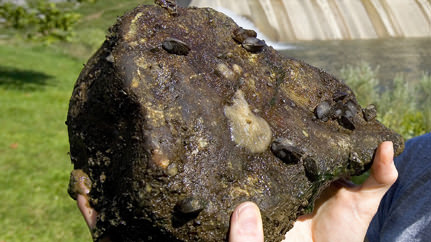Good news at Winnipeg Beach. Manitoba Conservation’s Rob Nedotiafko says the potash put into the harbour to rid the waters of zebra mussels is having an impact. He says it’s the same elsewhere.
“It was very opportunistic to be acting now,” Nedotiafko said. “We still have to be vigilant in our ongoing assessment and monitoring, which is part of this process as well. It’s not about treatment and walking away.”
Three more harbours — Balsam Bay, Gimli and Arnes — are being treated or will be in the coming days. The zebra mussels at Balsam Bay, Nedotiafko said, are “showing signs of significant distress.”
“There’s other battles to be won here,” he said.
Balsam Bay has been undergoing treatment since May 24 and is near completion, according to Nedotiafko. Treatment at Gimli harbour began on Saturday, with initiation at Arnes slated for later this week. Nedotiafko said they estimate 10 days for individual treatments to be completed, with June 13 set as the targeted date to have the entire operation finished.
Nedotiafko said the provincial conservation department first became aware of the zebra mussels in October and, at that time, began assessments on all harbours in the south basin and into the lake. He said there was no evidence of zebra mussels in other locations.
“The assessments provided evidence that we had four areas of concentration and a great opportunity to strike while the iron was hot,” Nedotiafko said, “and really try to make a difference in terms of preventing their spread and manifest.”
Nedotiafko said “everyone has a role to play here” in preventing the problem from returning — from prevention education to greater assessment of watercraft coming into the area. He remained hopeful those efforts would ensure the problem doesn’t return year after year.
“We certainly hope not,” he said, when asked if it could become a recurring issue. “Our efforts here are entirely precautionary to prevent the spread.”
Agencies/Canadajournal
 Canada Journal – News of the World Articles and videos to bring you the biggest Canadian news stories from across the country every day
Canada Journal – News of the World Articles and videos to bring you the biggest Canadian news stories from across the country every day



